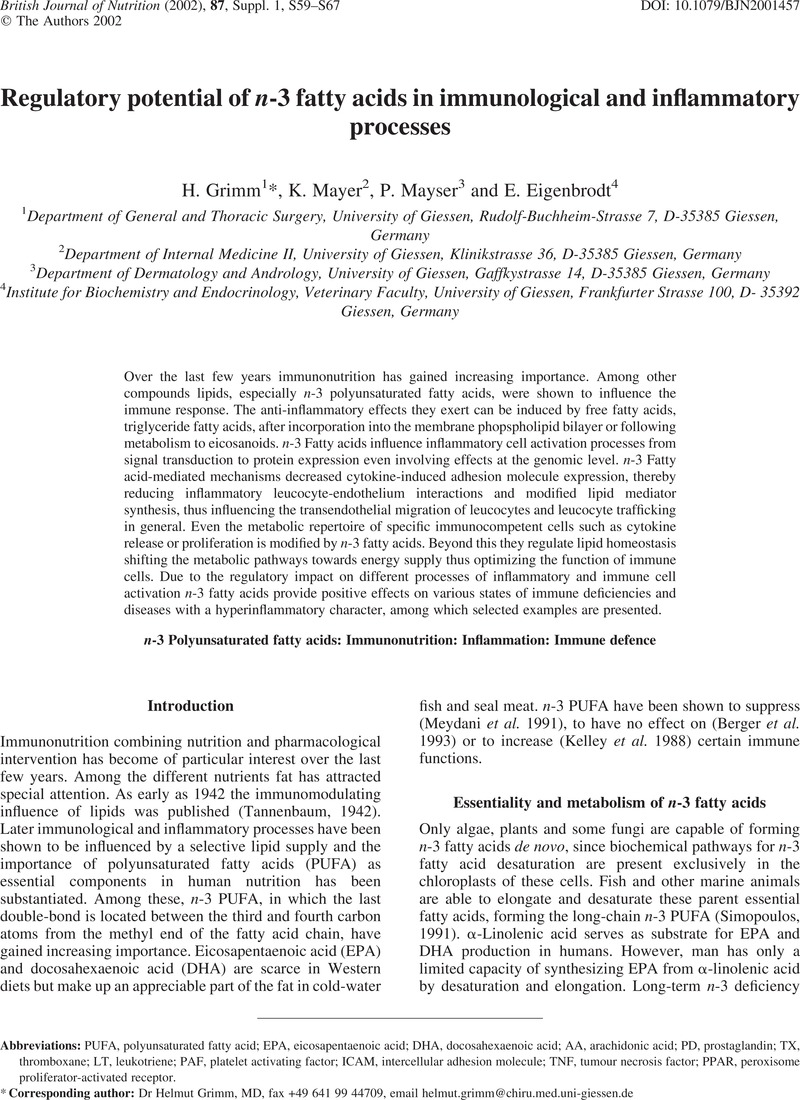Crossref Citations
This article has been cited by the following publications. This list is generated based on data provided by Crossref.
Trebble, Timothy
Arden, Nigel K.
Stroud, Mike A.
Wootton, Stephen A.
Burdge, Graham C.
Miles, Elizabeth A.
Ballinger, Anne B.
Thompson, Rachel L.
and
Calder, Philip C.
2003.
Inhibition of tumour necrosis factor-α and interleukin 6 production by mononuclear cells following dietary fish-oil supplementation in healthy men and response to antioxidant co-supplementation.
British Journal of Nutrition,
Vol. 90,
Issue. 2,
p.
405.
"Li a,b", Duo
Attar-Bashi b, Nadia
and
Sinclair b, Andrew
2003.
Flaxseed in Human Nutrition, Second Edition.
Hunter, Kenneth W
Gault, Ruth A
Stehouwer, Jeffrey S
and
Tam-Chang, Suk-Wah
2003.
Synthesis of cetyl myristoleate and evaluation of its therapeutic efficacy in a murine model of collagen-induced arthritis.
Pharmacological Research,
Vol. 47,
Issue. 1,
p.
43.
Rapoport, Stanley I
2003.
In vivo approaches to quantifying and imaging brain arachidonic and docosahexaenoic acid metabolism.
The Journal of Pediatrics,
Vol. 143,
Issue. 4,
p.
26.
Hahn, Andreas
and
Ströhle, Alexander
2004.
ω‐3‐Fettsäuren: Prävention degenerativer Erkrankungen.
Chemie in unserer Zeit,
Vol. 38,
Issue. 5,
p.
310.
de Mattos Machado Andrade, Priscila
and
das Graças Tavares do Carmo, Maria
2004.
Dietary long-chain ω-3 fatty acids and anti-inflammatory action: potential application in the field of physical exercise.
Nutrition,
Vol. 20,
Issue. 2,
p.
243.
Larsson, Susanna C
Kumlin, Maria
Ingelman-Sundberg, Magnus
and
Wolk, Alicja
2004.
Dietary long-chain n−3 fatty acids for the prevention of cancer: a review of potential mechanisms.
The American Journal of Clinical Nutrition,
Vol. 79,
Issue. 6,
p.
935.
Milani, Richard V
Lavie, Carl J
and
Mehra, Mandeep R
2004.
Reduction in C-reactive protein through cardiac rehabilitation and exercise training.
Journal of the American College of Cardiology,
Vol. 43,
Issue. 6,
p.
1056.
Mizock, Barry A.
and
DeMichele, Stephen J.
2004.
The Acute Respiratory Distress Syndrome: Role of Nutritional Modulation of Inflammation Through Dietary Lipids.
Nutrition in Clinical Practice,
Vol. 19,
Issue. 6,
p.
563.
Preetika, Arora
Padmini, Ghugre
and
Shobha, Udipi
2004.
Nutrient dense mixes for enteral feeding in India.
Nutrition & Food Science,
Vol. 34,
Issue. 6,
p.
277.
Madsen, Lise
Petersen, Rasmus Koefoed
and
Kristiansen, Karsten
2005.
Regulation of adipocyte differentiation and function by polyunsaturated fatty acids.
Biochimica et Biophysica Acta (BBA) - Molecular Basis of Disease,
Vol. 1740,
Issue. 2,
p.
266.
Heyland, Daren K.
Dhaliwal, Rupinder
and
Suchner, Ulrich
2005.
Clinical Nutrition.
p.
224.
van der Steen, Wim J.
2005.
Current Themes in Theoretical Biology.
p.
71.
Marik, Paul E.
2005.
Clinical Nutrition.
p.
373.
Storey, Amy
McArdle, Frank
Friedmann, Peter S.
Jackson, Malcolm J.
and
Rhodes, Lesley E.
2005.
Eicosapentaenoic Acid and Docosahexaenoic Acid Reduce UVB- and TNF-α-induced IL-8 Secretion in Keratinocytes and UVB-induced IL-8 in Fibroblasts.
Journal of Investigative Dermatology,
Vol. 124,
Issue. 1,
p.
248.
Dallaire, Frédéric
Dewailly, Éric
and
Ayotte, Pierre
2005.
Investigative Immunotoxicology.
p.
247.
Trumble, Troy N.
2005.
The Use of Nutraceuticals for Osteoarthritis in Horses.
Veterinary Clinics of North America: Equine Practice,
Vol. 21,
Issue. 3,
p.
575.
Senkal, Metin
Haaker, Rolf
Linseisen, Jakob
Wolfram, Günther
Homann, Heinz‐Herbert
and
Stehle, Peter
2005.
Preoperative Oral Supplementation with Long‐Chain Ω‐3 Fatty Acids Beneficially Alters Phospholipid Fatty Acid Patterns in Liver, Gut Mucosa, and Tumor Tissue.
Journal of Parenteral and Enteral Nutrition,
Vol. 29,
Issue. 4,
p.
236.
Kieft, Hans
Roos, Arnout N.
van Drunen, Jenneke D. E.
Bindels, Alexander J. G. H.
Bindels, Jacques G.
and
Hofman, Zandrie
2005.
Clinical outcome of immunonutrition in a heterogeneous intensive care population.
Intensive Care Medicine,
Vol. 31,
Issue. 4,
p.
524.
Miljanović, Biljana
Trivedi, Komal A
Dana, M Reza
Gilbard, Jeffery P
Buring, Julie E
and
Schaumberg, Debra A
2005.
Relation between dietary n−3 and n−6 fatty acids and clinically diagnosed dry eye syndrome in women.
The American Journal of Clinical Nutrition,
Vol. 82,
Issue. 4,
p.
887.



